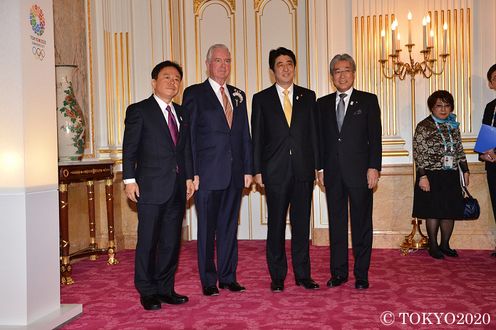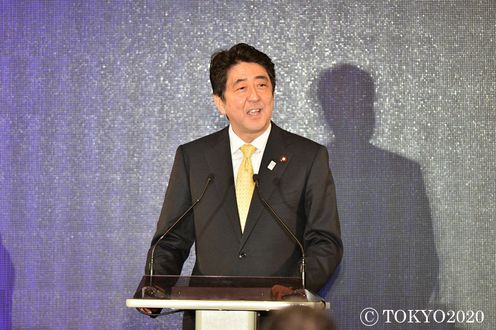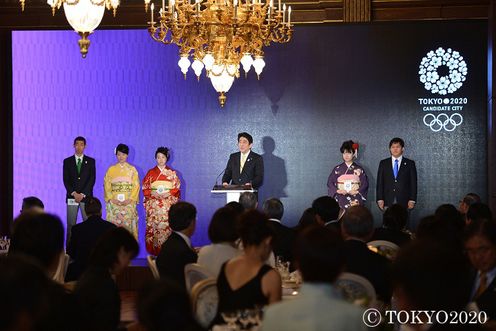Home > News > The Prime Minister in Action > March 2013 > Banquet for the Official Reception and for the Commemoration of the 50th Anniversary of the 1964 Tokyo Olympic Games
Banquet for the Official Reception and for the Commemoration of the 50th Anniversary of the 1964 Tokyo Olympic Games
Wednesday, March 6, 2013

Photograph of Prime Minister Abe, together with Governor Inose and President Takeda of the JOC, welcoming the Chair of the IOC Evaluation Commission, Sir Craig Reedie

Photograph of the Prime Minister delivering an address at the official banquet 1

Photograph of the Prime Minister delivering an address at the official banquet 2
Prime Minister Shinzo Abe hosted a banquet for the official reception and for the commemoration of the 50th anniversary of the 1964 Tokyo Olympic Games at the State Guest House, Akasaka Palace.
In his address, the Prime Minister said,
"Your Highness, Sir Craig, our honored guests and friends, allow me to express three things today.
Firstly, Japan is an aged society, but I would like the Committee to select Tokyo precisely for this reason.
Looking at the world records (in sports) made by elderly athletes, we find there a long list of the names of Japanese athletes. Ms. Mitsu Morita is the world record holder of the women's 100 meters, which she achieved at the age of 85. I heard that the people in her regional community refer to her as "Granma Bolt," because she resembles Usain Bolt with how fast she runs.
That world record is less than 20 seconds. I have serious doubts about whether I would be able to run as fast as that.
Therefore, in Japan, and in Tokyo, an Olympic movement seems to be reaching people of an age level that is the eldest compared to any place in the world. Consequently, the future of the Olympic games movement must start from here, in Tokyo.
Secondly, Japan has been working as a pioneer in diffusing sports throughout the world. Therefore, I would like to ask the Committee to select Tokyo.
It was back in 1965 when the Japan Overseas Cooperation Volunteers (JOCV) started. It is not a mere coincidence that this was the year following the 1964 Tokyo Olympic Games.
Japanese people felt so grateful for the friendship they received from throughout the world on that preceding year, and decided to do something in return.
Currently, there are 1,100 women and 795 men dispatched to 71 countries as JOCV, many of them working as sports instructors. At present, 39 women and 60 men are engaged in the instruction of sports such as gymnastics and judo.
Ladies and gentlemen, Japan is at the forefront of the effort to convey the joy and happiness of sports to every corner of the world.
Thirdly, Japan is full of narratives that inspire many people. That is also why I would like the Committee to select Tokyo.
"From destruction to the new vigor." This is the narrative. Stated differently, on one side is the disaster that we suffered as a result of the earthquake, tsunami and the nuclear power plant accident, and on the other side is the reconstruction from such disaster.
What bridged the two sides are the kindness, courage and calmness everyone showed and gave one another.
I am a man who once failed as the Prime Minister. However, when I visit small towns where there are people who lost their families, I find myself feeling consoled by such people affected by the disaster. I was often told to stand up once again.
It was the kindness, courage and calmness that the people in the stricken areas showed that gave me a supportive push to stand up once again.
By doing so, I wanted to show the entire country that everyone should be given a second chance.
There was a natural disaster, and there was also a tragedy caused by human. Even so, we can all make a comeback. That will precisely be the powerful message that the Tokyo 2020 conveys to the world.
Before closing my address, Mr. Takashi Ono, could you please stand up? Mr. Ono led the Japanese National Team for the 1964 Tokyo Olympic Games as a captain and took the Olympic Oath. Mr. Ono, you are a hero of my generation.
Because of Mr. Ono, we all became strong supporters of the Olympic movement.
Thank you, Chair and Committee members, all of whom I highly esteem, for coming today. Now I cannot wait until the day of the announcement, the day the IOC says the decision is Tokyo.
Thank you very much for your attention."


